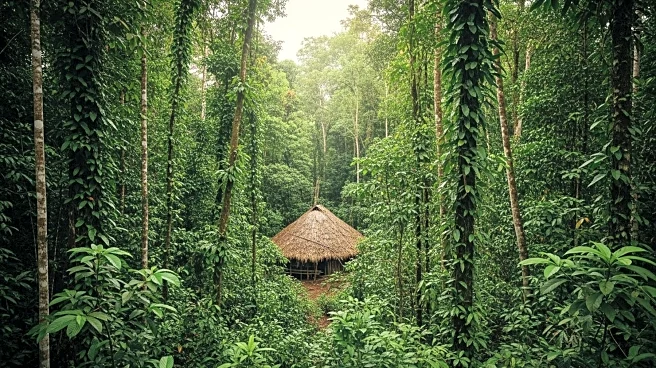What's Happening?
Survival International, an Indigenous rights organization based in London, has released a report identifying 196 uncontacted Indigenous groups across 10 countries, primarily in the Amazon rainforest. The
report highlights that these groups face significant threats from logging, mining, and agribusiness, with nearly 65% threatened by logging alone. Fiona Watson, the organization's research and advocacy director, describes these threats as 'silent genocides,' occurring without media coverage. The report warns that half of these groups could be wiped out within a decade if governments and companies do not take action. Uncontacted peoples are contemporary societies that avoid outsiders due to historical violence and disease, and they play a crucial role in preserving forests essential for combating climate change.
Why It's Important?
The survival of uncontacted Indigenous peoples is critical not only for their own rights but also for global environmental stability. These communities help maintain the Amazon rainforest, a vital component in the fight against climate change. The threats they face from logging, mining, and agribusiness could lead to the loss of invaluable cultural knowledge and biodiversity. The report calls for stronger legal protections and a shift in public perception to view these groups as integral to global citizenship. Governments and corporations are urged to recognize Indigenous territories and halt destructive activities, emphasizing the need for public pressure to drive change.
What's Next?
The report advocates for a global no-contact policy, urging legal recognition of uncontacted territories and suspension of extractive projects near these lands. It calls for prosecution of crimes against Indigenous groups and highlights the need for companies to trace supply chains to prevent sourcing from Indigenous lands. The report stresses the importance of public opinion and media coverage in achieving these goals. Governments are encouraged to enforce international treaties affirming Indigenous rights, though enforcement remains uneven across countries.
Beyond the Headlines
The report underscores the ethical responsibility to protect uncontacted peoples, who are often seen as barriers to development. It challenges stereotypes and calls for a reevaluation of their role in global society. The protection of these communities is linked to broader human rights and environmental issues, highlighting the interconnectedness of Indigenous survival and global climate stability.









